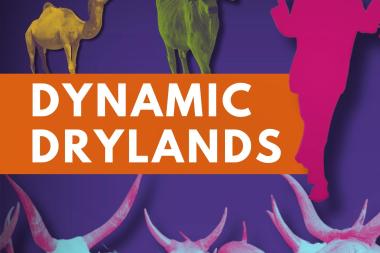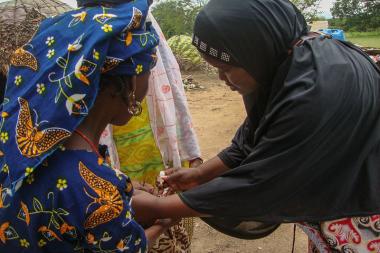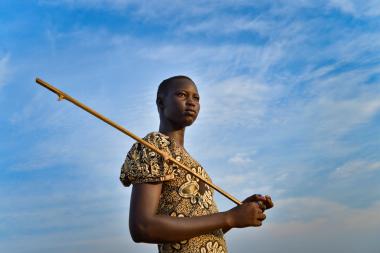Blog
"Invisible, yet indispensable" - SPARC's new podcast episode hears from Fulani pastoralist women
SPARC's new episode of Dynamic Drylands speaks with the women and NGO involved in a new programme, which is training Fulani pastoralist women to conduct research in their own communities.
Publisher SPARC
Below is an edited transcript of “'Invisible, yet indispensable': Fulani pastoralist women - in their own words”, the latest episode of Dynamic Drylands podcast. We recommend listening to it in its original form for the full effect. You can do so on Acast, Spotify and Amazon Music.
Bola Mosuro: The life of a pastoralist isn’t easy and that’s putting it mildly. Trying to eke out a living raising cattle while grappling with numerous challenges, whether environmental, economic, political or social, is hard. Imagine then how much more difficult it is for those who have little control over resources or decision making. I’m talking about women. They face a double whammy in the drylands. As we’ve heard in previous episodes, they collect water and firewood and are responsible for food and dairy production. Yet they are marginalised.
With limited access and control over financial and productive resources, women of Nigeria’s nomadic Fulani community are raising their voices. This advert is a powerful rallying cry to women pastoralists across Northern Nigeria:
FUDECO radio jingle: Women and young girls…. we want to be treated with dignity and respect, to have sources of income to look after our children and families.
Bola: And it’s pastoralists - who herd cattle across grazing lands - who are at the core of Nigeria’s food chain.
In busy, bustling city meat markets in Abuja and Lagos, it can be easy to forget where your beef, goat or lamb comes from. But that would be a mistake.
In this special bonus episode of Dynamic Drylands, we focus on women - the often-unsung heroes of nomadic communities. And we train our spotlight on Fulani women in northern Nigeria.
The country is home to around 15 million pastoralists, who produce over 80% of the country’s meat. Many of them live in remote parts of the country, where ongoing insurgency and conflicts keep them several days’ travel away from the nearest towns.
Maryam Yousef Bayero: This pastoralism is our primary source of livelihood. That is where we solve our problems, as a family…. I was being educated through the animals. So these animals that are usually being kept by pastoralists, they are their only source of income. My dad, he only relies on these animals. When there is a problem in the family, he will sell and solve the problem, like many other pastoralists are doing.
Bola: That was Maryam Yousef Bayero - just one of the women we’ve spoken with about their lives and their community.
Pastoralism in Nigeria is a hot button issue – with escalating farmer-herder clashes, and an ongoing row in national politics about whether to ban open grazing altogether in some states. In all this, pastoralist women are rarely considered, even though they face a unique set of challenges.
In this podcast you’ll hear about these women’s lives - and the impact of a special programme of training - in their own words.
I’m Bola Mosuro. I was a journalist with BBC World Service for over 30 years and in that time, I reported on a host of issues from all over the African continent - from globalisation, conflict, and the demands of climate change, to emerging trends within family life and culture. I know just how diverse, inventive and resilient Africa’s people are.
So what is life like for women living in remote communities in northern Nigeria? Here’s Rukkaiyatu, a researcher who comes from a pastoralist background:
Rukkaiyatu Bashir Ribadu: My name is Rukkaiyatu Bashir Ribadu. I'm a researcher from northeastern Nigeria. I'm a pastoralist woman.
My grandparents came into the city. They were educated. So we lived in the city. I don't rear the cattle myself but I still share that cultural value. As a pastoralist woman, that identity shapes everything I do. I understand the values, the rhythms, and also the struggles that pastoralist communities, especially women, face every day.
If you communicate with the pastoralist women, they don't even dream much. They won't tell you that they want to buy a car, they want to own houses. Their dream is: they want peace. They want food on the table. They want their children to be educated.
Life for the Fulani woman is filled with hard work. They carry the weight of the entire household. They wake up early in the morning; they pray. And before they even pray they take the responsibility of giving the man the water. The woman bears the burden of the household, the community, raising the children. And yet, they don't take a decision. But what strikes me most is their dignity. They don't complain. They survive. Invisible, and yet indispensable.
Bola: Rukkaiyatu works for FUDECO, whose name you’ll hear a lot in this episode. FUDECO – or the Fulbe Development & Cultural Organization – is a Nigerian NGO which supports pastoralist communities. They have been working with pastoralist women and girls to overcome some of the barriers they face – in an innovative way.
Rukkaiyatu: Now, I serve as a lead researcher at FUDECO, in Adamawa and Borno State, where we engage directly with women and girls to document their lived realities and co-develop solutions. And in FUDECO, we use a localisation approach. So, the community researchers we use in collecting the data, they are also locals. We get people who are a bit educated. And then we train them to serve as our community researchers and they go back to their community to collect this data. So this approach, I find it very interesting because the research is not just about them, it is with them.
Bola: This focus on recruiting pastoralist women to support with research – or, ‘participatory action research’ - is pretty new. The team recruited more than 20 community researchers and volunteers, and trained them to carry out interviews.
Specifically, these pastoralist women were recruited by FUDECO to review the impacts of a previous training session: one in which women were trained in a range of money-making skills, from henna design to product making and baking, and give them the support they needed to start their own business. Here’s someone involved in the project to explain:
Mohammad Habibu Hussain: My name is Muhammad Habibu Hussain. I am the chairman of FUDECO Nasarawa state chapter. We trained 250 pastoral women on several skills and most of them continue to practice the skills and they benefitted a lot. After the empowerment project exercise, we organised a launching programme and issued certificates to the graduates in 2021 at the Nasarawa State University campus in Keffi and also provided them with start-up funds to continue with their skills, because women do not get financial support.
The training is on income generation skills like hair-making, doughnut and cake making, because Fulani women are widely known for selling milk and yoghurt — so we modernised how they can package and sell their yoghurt. Also, poultry, shoe and bag making.
Bola: Several years later, the newly trained FUDECO researchers came back to these places to ask women: what happened next? As Umaira Hassan Suleiman explains:
Umaira Hassan Suleiman: There was a training on research by Dr. Rukkaiyatu. I never knew anything about research: that someone goes and interviews people and transcribes. She taught us how to do research… I was a community researcher. We went to Mayo-Inne, we went to Garandiya and another community. We interviewed them, then sent them to our leaders.
The research was in several sections: first their livelihood, their inclusion in society, things like that. The second is regarding whether the woman have a source of income, can vote, who they take the problems to, and how they are included.
Bola: They found that a number of Fulani women had experienced a real benefit from the training:
Hafsat Muhammad Sani: My name is Hafsat Muhammad Sani… They trained us on so many things but I was interested in make-up and henna. As for the make-up, I am not really doing it for money but I am also invited to weddings, other celebrations to do henna and get paid. I support my relatives and friends; for example, whenever there’s an event my family and friends do not have to hire for henna and make-up. I support them with the services.
Bola: And Bello Basma Usman...
Bello Basma Usman: What I am doing now is that I have opened a shop where I sell various items. I have benefitted from the support very well. I bought a goat to rear. It has produced a kid. I support my parents. For example, I buy clothes for my mother, and she is very happy. I have been helping my children and family with my income, and they are much happier. I support my husband in household shopping. When my children are going to school, I buy small things for them like biscuits, and they are very happy.
Bola: And Jamila Mohammad Bello...
Jamila Mohammad Bello: When FUDECO trained us they gave me a certificate and start-up capital. The start-up capital is what I have been trading with, and it helped a lot. I sell porridge, peanuts, doughnuts, cakes, zobo…. The money has really helped, and I have really benefitted. At the pleasure of Allah, I have had a lot of success. I have independence. My start-up capital has increased to 100,000 Naira. I pay school fees for my four children. So, I am really successful.
Bola: This economic boost was also shared by the pastoralist women who were trained as researchers. Here’s Fatima Idris:
Fatima Idris: They trained us on how to carry out research. We went to our communities; we asked them about their lives and livelihoods. The training improved my knowledge. I didn’t know about research before the training. They paid us. I used the money to buy a phone; I helped my husband to pay school fees for our children. We stay in a rural area – all our community use my phone now.
Bola: Now while buying a phone may not sound like a big deal, for people like Fatima and her community it is life-changing. One of the key findings from the researchers’ work was that pastoralists seldom use radio, TV or mobile phones – and for women, these numbers were even lower. In one of the research locations, only four men and no women owned a mobile phone.
Owning a phone means access to news and information. It means being able to receive online payments, and check market prices, rather than walking into the city to get paid for the milk you’ve sold. So something as small as Fatima’s mobile phone can be truly revolutionary.
But as well as making an income, something even more extraordinary came out of this training. Bringing community researchers on board wasn’t just giving them an income — it was also building women’s skills and confidence.
Rukkaiyatu: Something beautiful happened during our research. Women that usually don't talk much, they find out that I come with community researchers, amongst them there are men. But I am the lead researcher. I do the introduction and they introduce me to say this is the lead and what have you. Like they find it inspiring. This will bring them to imagine new possibilities for themselves. And that is the kind of empowerment no programme can buy.
Bola: One clear example of this shift is women’s responses when they were asked about education. In Fulani pastoralist societies, education is often seen as incompatible with pastoralist cultures and traditions - particularly for girls. But many of the women who were trained afterwards experienced a higher standing within their communities.
Let’s start with Sa’adatu Usman Moddibo:
Sa’adatu Usman Moddibo: The rural pastoralists Fulbe were not interested in Western education. They didn't see the benefits of education. But now their awareness has been raised. They see how education has given people better lifestyles. They see educated people have houses, cars etcetera. They now send their children to school to help their children and themselves.
Bola: And here’s Fatima Idris:
Fatima Idris: Previously girls never went to school and were married off as soon as they reached puberty. But today both girls and boys are enrolled in school.
Bola: And Umaira Hassan Suleiman:
Umaira Hassan Suleiman: For example, because they don't know their rights, when you go to hospital, the women pastoralists are discriminated against. I want women trained to know their rights so they can stand and regain their freedom. Our children should be educated and be trained on careers. Fulbe pastoralist children should become engineers, doctors, pilots and others. Everyone should stand up and do things for themselves. A woman should not wait to be given. For your dignity you need a source of income to help yourself, help your husband, your children and family.
Bola: Beyond the immediate benefits of learning new skills and generating an income, this training has led to a different kind of empowerment for the pastoralist women - an expanded vision of themselves as valuable and active community members. An increasing number of women are now involved in community dialogues and decision-making forums, and women who had previously said they couldn’t speak in public are now actively taking part in FUDECO workshops.
For many women, the real impact of this training goes beyond starting a business or supporting a family. It’s about having the tools and the voice to face any disruption that comes their way.
Rukkaiyatu sums it up perfectly, so let’s leave the last word to her:
Rukkaiyatu: The change we are seeing is tangible. A lot of the women are already running their small businesses. Others are managing their cooperative funds. Many are enrolling their daughters in school. So we are seeing women start to speak in community meetings, join advocacy efforts, and even mentor other women.
Actually, that helps women to cope with shocks because this is where the empowerment becomes resilience. Conflicts, flood, economic hardship, violence, domestic violence, pandemic disruptions... Women have now gotten the skills, the network, and the sense of ‘this is what I want to do’. Because a lot of the time when there are shocks, the government and a lot of other agencies focus more on the people that are known within the community, whereas the pastoralist people are hardly reached. And more than anything women now know how to organise, how to ask questions, how to speak and find alternatives when there are crises.
We are not just helping them to survive the shocks. We are helping them to become strong enough to face the next one. And the one after that. We don't pray for it but we prepare them to face the shocks.
Bola: Rukkaiyatu encapsulates how small interventions, co-designed with and delivered through local people, can create powerful and long-lasting change – because the approach itself is empowering.
Rukkaiyatu: ... And that’s the kind of empowerment no programme can buy!
Bola: Many thanks to Rukkaiyatu, the FUDECO team, and all of the women who shared their experiences with us. I’m Bola Mosuro, and you’ve been listening to Dynamic Drylands - a special series from SPARC.
Many thanks for listening.
Hosted by Bola Mosuro. Contributors: Rukkaiyatu Bashir Ribadu, Maryam Yousef Bayero, Mohammad Habibu Hussain, Umaira Hassan Suleiman, Hafsat Muhammad Sani, Bello Basma Usman, Jamila Mohammad Bello, Fatima Idris, Sa’adatu Usman Moddibo and Asmau Usman Muhammad. Sound effects and audio with Maryam Yousef Bayero provided by Elphas Ngugi.
Dynamic Drylands is produced by the research-to-action programme Supporting Pastoralism and Agriculture in Recurrent and Protracted Crises (SPARC). This work was carried out with the aid of a grant from the International Development Research Centre, Ottawa, Canada.



